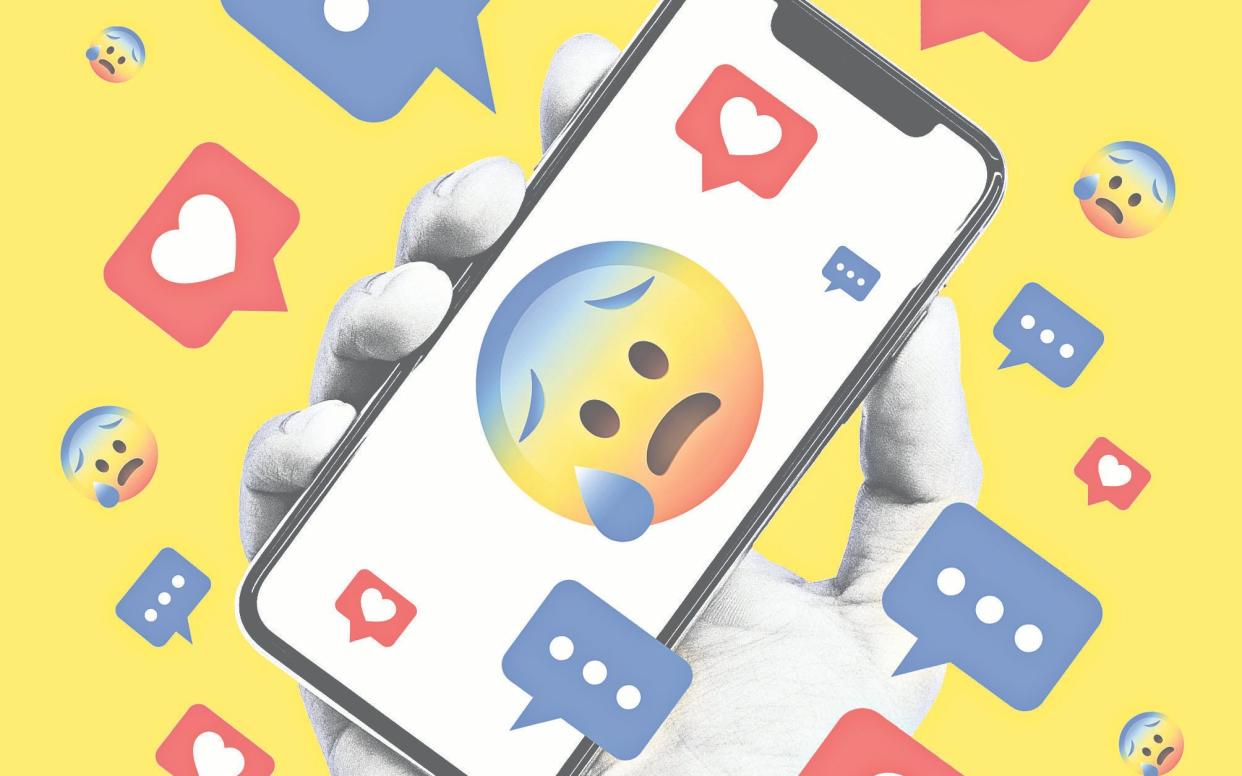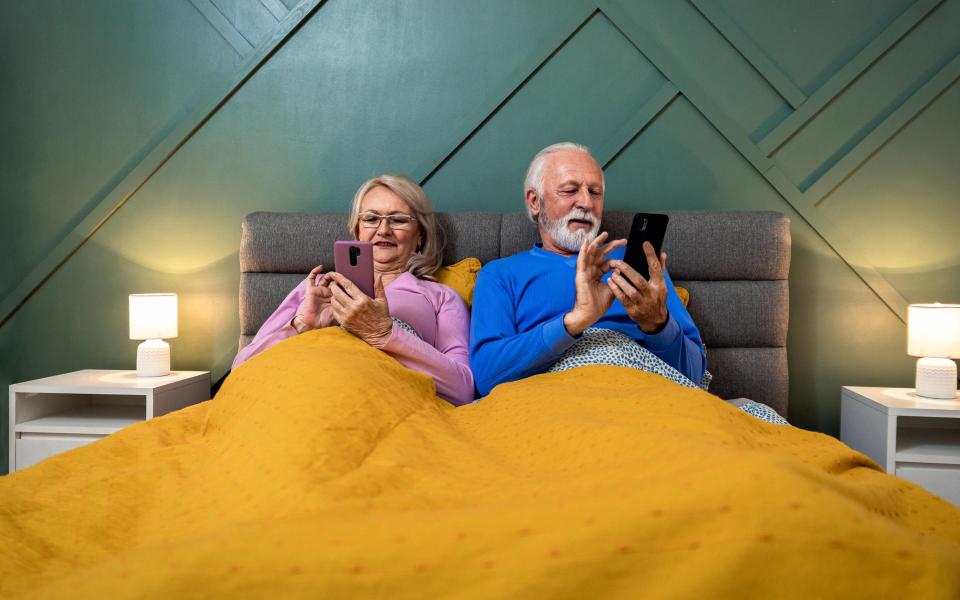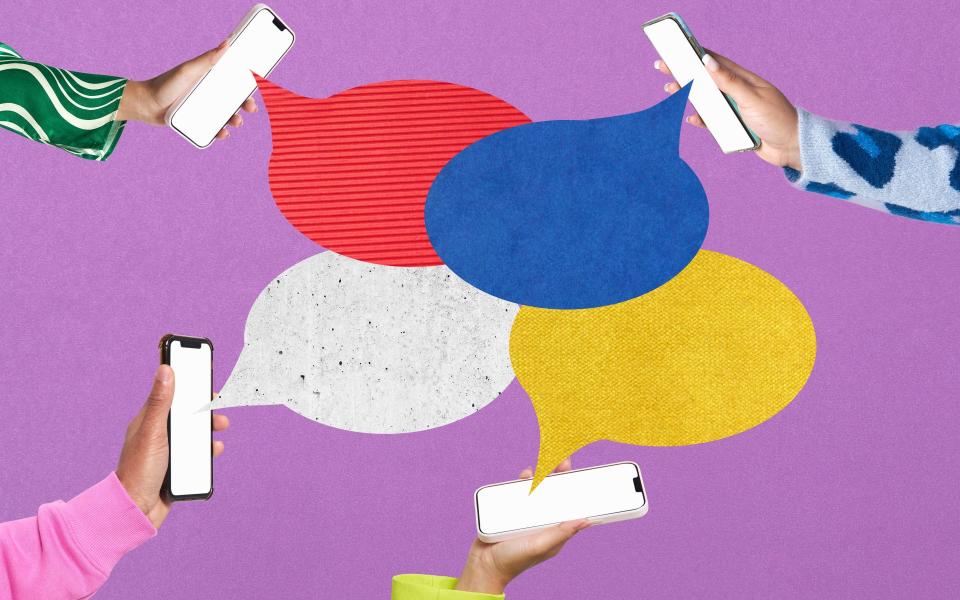The rise of midlife social media anxiety – and how to stop scrolling

It’s 2.30am on a dark, cold night during lockdown 2.0 and Harriet, a mum-of-two, suddenly wakes, wide eyed. The house is quiet but she tosses and turns in the bed she shares with her husband in an attempt to settle back to sleep, but something is on her mind. She can’t resist grabbing her phone from her bedside. As the screen lights up between her fingers, she is surprised and excited, albeit with a twinge of shame, to see a list of Facebook notifications fill her homescreen.
“I’d spend at least an hour quietly replying to messages and searching my feed for news in the middle of the night,” says Harriet, a 48-year-old TV producer from London. “I was addicted day and night and it definitely wasn’t conducive to me feeling happy.”
The sleepless nights and the constant phone checking; the need to scroll, like, share and comment, was not only interfering with her mental wellbeing but also her family and work life. “Although I got quite a lot out of the conversations at the beginning, it was a slippery slope. I couldn’t stop checking Twitter and doom scrolling. It’s a very negative space. The noise wasn’t good,” she says.
“I’ve rationed myself to checking my feeds once a week now. It’s not healthy, actively seeking people out that don’t make you feel good.”
It appears that while much has been documented on the link between overuse of social media and depression in young people, there has been little research on the impact it’s having on the lives of us digital late-adopters in midlife, who are now the second most prominent generation on social media.
Psychologist Sally Baker, who has spent 20 years transforming the lives of negative thinkers, says: “Although we weren’t born into the world of tech like the millennials, we have quickly picked up on the potential for making connections with like-minded people in their droves. Our midlives are a rich seam of content for the platform.”
One quick flick of your thread on Instagram and the chances are your algorithm will serve up a steady stream from niche communities or influencers sharing (or oversharing?) advice on all the muddles of midlife: menopause, grief, dressing for your changing shape, divorce, dealing with teens and navigating redundancy. And clearly, there’s an audience for it. The tens of thousands of likes on some posts are sometimes instantaneous.
A new global report in April this year found women feel more stressed today than they did a year ago, and almost half feel burned out (while our 47th year is meant to be the most unhappy time in our life, according to a study by former Bank of England economist David Blanchflower). No wonder then that some of us are seeking out these virtual communities, or finding a “tribe”, as a coping mechanism in the middle years.
Baker continues: “After two years [of social isolation] many have lost the habit of meeting up in real life, so social media has replaced that. Curating one’s group means people can feel valued and heard.”
There’s a plethora of platforms providing space and connection for those who might feel marginalised with age.
For Anna Whitehouse (aka @mother_pukka), journalist and author of Underbelly, it was the new motherhood community on Instagram that awakened her when she was at home alone with her first baby.
“When I found Instagram I was like a moth to a flame,” reveals Whitehouse. “The world had made me redundant since I’d had a baby. But suddenly, with one hand I could be breastfeeding and in the other I could be building either a business, a friendship, a connection and at no cost. It’s given women voices that would have been otherwise silenced by the patriarchy. The movement is hugely positive.” It’s this exact corner of the internet from where Whitehouse’s Flex Appeal campaign went viral.
But in the context of her motherhood community, she says: “For me, back in 2014, I kept pressing those buttons and getting drawn into the underbelly of the internet: the DMs, the likes, the comments. ‘Are you post-natally depressed? Me too!’ or ‘You’ve had a miscarriage too?’ Suddenly a whole new world opened up to me.” One which, now with hindsight, she says, was not healthy.

“The connections I made were slightly a poisoned chalice,” says Whitehouse. “The women who sometimes seek the connections online are actually vulnerable. I was seeing women who were postnatally depressed or peri menopausal, for example. I don’t mean to demonise social media, as there are positives, but ultimately, I was online for up to eight hours a day, as I think a lot of my friends were.”
Whitehouse warns: “As an older generation we are carrying a lot more baggage, whether that’s emotional, mental, physical, postnatal, menopausal, on top of everything else. When you’re looking at those pixelated squares, comparison culture creeps in.”
Comparing yourself to others seems inevitable on social media, as a study led by author Dr Bruce Hardy at Temple University wrote in the journal Computers in Human Behaviour found when they surveyed almost 750 adults.
“In their desire to validate accomplishments, many middle-aged adults may look to high-school peers (ie those who roughly had the same starting line) as a point of comparison. As most people present themselves hyper-positively online, social comparisons are unrealistic and may deteriorate self-worth and mental wellbeing.”
The potential emotional toll of using social media is not to be underestimated. Dr Emma Hepburn, a clinical psychologist and author of A Modern Toolkit for Happiness: “Low moods arise if you’re a passive user; not using social media for a specific use. Our brain is designed to compare, but not with this much data. When we’re already down, sleep-deprived, stressed or overwhelmed then the impact of this on our cognitive and psychological functioning may mean we fall into the attention traps of social media.
“We can often fall into the trap of scrolling when we plan to rest, which is unhelpful. Feelings of Fomo come into play too. There’s evidence that just having your phone next to you can distract us from aspects of our life in the real world that are meaningful to us and give us joy.”
But what’s the difference between the playful gratification of your (sometimes pointless) curiosity and serious addiction? “It’s a behavioural addiction when our phones become a second self which we feel bereft without,” says Dr Hepburn. “You have difficulty removing yourself from your phone or social media and that impacts negatively on a person’s wellbeing or functioning. You might also try to hide usage.”

Fashion editor Anna Cascarina (@annacascarina) is the first to admit the tiny red-heart-shaped “likes” and the validation contribute to the high dopamine hits she gets from her phone. “My phone is always lighting up and I can’t ignore it,” says the former magazine fashion editor, who now has 74,500k followers. “I know I should just post and get on with my life, but I’m always picking up my phone to check.”
But like many making a living on Instagram (which incidentally, is made up of 84 per cent women juggling a career around their caregiving responsibilities), Anna feels the pressure from advertisers to build likes, engagement and clock up the click-throughs and add-to-baskets if they’re marketing a product via an #AD or a #gift or an #affiliate link. While also trying to “get on top” of Instagram’s algorithms (so your posts are seen, and consequently liked). Put like that, earning a living as an influencer doesn’t seem so easy.
She also adds: “One of the reasons I continue to build my career on Instagram is because women over 40 are under-represented in fashion content online. But the truth is many brands won’t even work with me because of my age, which makes me feel like I’m fighting a losing battle.”
Although some influencers such as Bella Younger (otherwise famously known as @deliciouslystella) and Jess Ann Kirby have publicly struggled with the fatigue of the Instagram creator game and being at the mercy of Meta (the former seriously burnt out and checked into rehab; the latter now blogs about the benefits of mental clarity and freedom).
Likewise, some followers, such as Harriet and some of her network, are also choosing to unfollow after feeling overwhelmed by the envy-inducing feeds and reels. Harriet says: “It’s not that I’m ashamed of what I’ve posted, but the time I’ve wasted on social media! I get sucked into mini whirlwinds. There’s always some craze, drama or panic which has been manipulated to create clicks and drive traffic. I have to remind myself there’s more to life. Give me a book any day.”
But Whitehouse admits she’s not completely fallen out of love with it just yet. “It just need to be better regulated,” she says. “It doesn’t matter if you’re a follower or an influencer, it can be a lot to process. Also nuance gets lost on social media and conversations can get quite combative.”
Baker concludes: “The gold standard in connection is face-to-face human contact, but social media provides a close secondary experience. What we learnt in the pandemic is that we didn’t miss ‘stuff’; we missed connection and connecting online is proving life-enriching for many mid-lifers.”
But remember, like everything else in midlife, it’s all about moderation…

